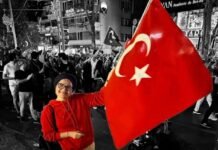Iranian human rights advocates have expressed concern that Iranian refugees in Turkey are at risk of being returned to Iran following a shift in asylum policies that transferred refugee oversight from the United Nations to Turkish authorities.
In a column for Iran International, a London-based Persian news outlet, journalist Negar Mojtahedi said among those who risked deportation was Nahid Modarresi, an undocumented refugee. The young Iranian woman is currently in hiding, fearing detention and forced return.
Modarresi fled Iran in 2018 due to her sexual orientation and has been publicly involved in human rights activism against Iran’s government. She was previously granted protected person status by the United Nations High Commissioner for Refugees (UNHCR), but Turkey’s Council of State revoked her status this year, putting her at risk of deportation.
“My life is in danger,” she said. “If I get sent back to Iran, they will arrest me — maybe execute me.”
Iran’s penal code criminalizes homosexuality, punishable by death for men and 100 lashes for women, with the possibility of execution for repeat offenses.
While Turkish authorities have not disclosed official figures, a Turkey-based researcher working with asylum seekers estimates that at least 3,000 Iranians previously granted protected status have seen it revoked.
Turkey, home to the world’s largest refugee population, ended UNHCR’s direct role in registering refugees in 2018, assuming full control over asylum decisions. The shift followed a European Union-Turkey migration agreement, tightening restrictions for migrants.
Since then, refugee rights advocates say Turkey has stepped up deportations for all nationalities, including of Iranians fleeing political persecution. In December 2024 Turkish authorities deported approximately 300 Eritrean migrants to Eritrea, a country known for severe human rights abuses, including indefinite military conscription and torture. In 2022 the UN and human rights organizations also raised alarms over Turkey’s expulsion of Afghan asylum seekers back to Taliban-controlled Afghanistan.
Modarresi’s case gained international attention after her sister, Elham Modarresi, was imprisoned in Iran in 2022 for participating in the “Woman, Life, Freedom” protests. Elham was detained by Iranian security forces and allegedly tortured while in Kachooie Prison outside Tehran.
After being released on bail, Elham escaped to Turkey and later to Canada, where she received a life-saving liver transplant. Nahid Modarresi remains stranded in Turkey.
Her legal team has filed an application to relocate her to Canada, securing five sponsors, but they warn that her time is running out.
“These activists face arbitrary detention, possible torture, and years of prison if they are extradited,” said Hadi Ghaemi, executive director of the Canada-based Centre for Human Rights in Iran (CHRI).
In addition to the fear of being deported, refugees said conditions in deportation centers were dire. Sina Rostami, a 35-year-old Iranian protester detained in Turkey, described these conditions as “inhumane.”
“They treat us like we’re not human,” he told Iran International, with facilities lacking lighting and basic sanitation.
Rights advocates say Turkey’s relationship with Iran’s government may be influencing its refugee policies. Following Iran’s political support for Turkish President Recep Tayyip Erdoğan after a failed 2016 coup, critics argue Ankara has been less willing to shelter Iranian dissidents.















